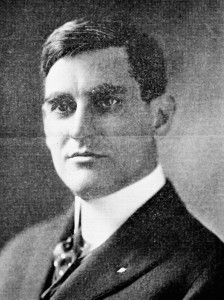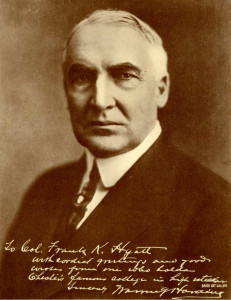 After completing high school in three years, George B. Christian, Jr., left Marion Ohio and enrolled at Pennsylvania Military College. He was a gifted student, earning the title of distinguished Cadet for earning a spot on the Merit List. Colonel Frank Hyatt wrote that “Mr. Christian is a cadet of high character and excellent intellectual attainments.” In 1896, he graduated with a Civil Engineering degree. He then returned to Marion and worked for his father at the Norris & Christian Stone and Lime Company.
After completing high school in three years, George B. Christian, Jr., left Marion Ohio and enrolled at Pennsylvania Military College. He was a gifted student, earning the title of distinguished Cadet for earning a spot on the Merit List. Colonel Frank Hyatt wrote that “Mr. Christian is a cadet of high character and excellent intellectual attainments.” In 1896, he graduated with a Civil Engineering degree. He then returned to Marion and worked for his father at the Norris & Christian Stone and Lime Company.
Christian was also the next-door neighbor of Warren and Florence Harding. At an early age he delivered the Star newspaper, owned and operated by Harding. When Harding ran for the U.S. Senate in 1913, Christian was very involved in the campaign. One of the first decisions Harding made as senator-elect was to hire Christian as his personal secretary. As Harding’s alter ego this association continued throughout Harding’s presidency.
As Secretary to the President, Christian was the precursor of today’s White House Chief of Staff. He would act as the buffer between the President and public, keeping the President’s schedules and appointments, managing his correspondence, communicating to the press and managing the White House staff, which consisted of 31 people during the Harding Presidency.
 In February, 1920, PMC held its annual recognition of Washington’s birthday. Then Senator Harding, accompanied by Christian, was the featured speaker and was awarded the degree of Doctor of Laws. Harding’s address was described as a “tribute to PMC.” Although Harding declined an invitation to attend the Centennial Commencement Ceremony, Christian sent a photo of the President inscribed with the comment “… from one who holds Chester’s famous college in high esteem.”
In February, 1920, PMC held its annual recognition of Washington’s birthday. Then Senator Harding, accompanied by Christian, was the featured speaker and was awarded the degree of Doctor of Laws. Harding’s address was described as a “tribute to PMC.” Although Harding declined an invitation to attend the Centennial Commencement Ceremony, Christian sent a photo of the President inscribed with the comment “… from one who holds Chester’s famous college in high esteem.”
Christian was devastated after the unexpected death of Harding in 1923. In an interview with the New York Times he commented: “For nearly nine years I worked beside him and my present sorrow is somewhat assuaged by the feeling of satisfaction of having been permitted to serve a great president, a most humane and considerate chief and the finest friend as has ever been given a man to have.” Although he assisted with the transition of President Coolidge, Christian turned down the President’s offer to remain.
For the next few years, Christian devoted his time to working with the Harding Memorial Association, which was formed shortly after Harding’s death to plan and raise money for the Harding Memorial. He had also planned on writing a biography about Harding and his own experiences, but he developed glaucoma, with eventually robbed him of his sight. By 1930 he was inactive and his health began to fail. died in 1951.


[…] Christian continued to fill this role after Harding became president, effectively functioning—we read—as “the precursor of today’s White House Chief of Staff.” So maybe he […]